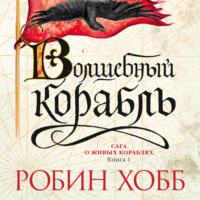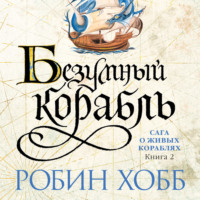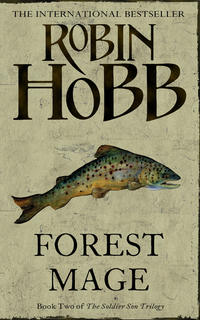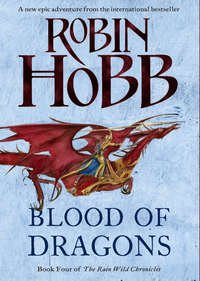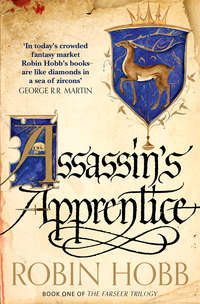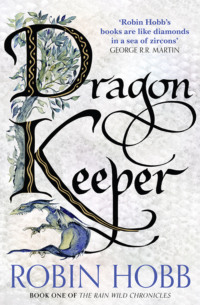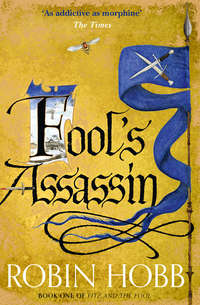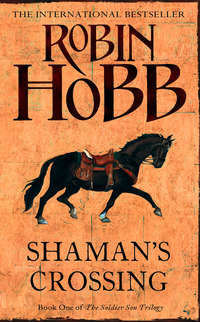
Полная версия
Fool’s Fate
The last items were pastries about the size of a man’s fist. Web carried them in a sack of twisted and woven grass lined with wide fronds of seaweed. As he set them out on the table, I smelled fish. The pasties were stuffed with chunks of white fish in rich and greasy gravy. It heartened me when Thick tottered out of his bed to come to the table for one. He ate one hurriedly, pausing only when his coughing fits forced him to, and a second one more slowly, with another cup of tea to wash it down. He coughed so heavily and for so long after his tea that I feared he was choking, but at last he took a deeper breath and looked round at us with watery eyes. ‘I’m so tired,’ he said in a trembling voice, and no sooner did Swift help him back to bed than he nodded off to sleep.
Swift had enlivened our meal with his discussion of the town with Web. I had kept quiet while we ate, listening to the boy’s observations. He had a quick eye and an inquisitive mind. It seemed that most of the market-folk had been friendly enough after they’d seen his coins. I suspected that Web’s genial curiosity had once more worked for him. One woman had even told him that the morning’s low tide would be a good time for gathering the sweet little clams from the beaches. Web mentioned this, and then wandered into a tale of clamming with his mother when he was a youngster, and from there to other tales of his childhood. Both Swift and I were fascinated by them.
We shared another mug of the tea I’d made, and just as the afternoon began to seem companionable and pleasant, Riddle arrived at the door. ‘Lord Chade sent me to say you’re to go up to the mothershouse for a welcome,’ he announced from the door.
‘You’d best go then,’ I told Web and Swift reluctantly.
‘You, too,’ Riddle informed me. ‘I’m to stay with the Prince’s half-wit.’
I gave him a look. ‘Thick,’ I said quietly. ‘His name is Thick.’
It was the first time I’d ever rebuked Riddle for anything. He just looked at me, and I could not tell if he were hurt or offended. ‘Thick,’ he amended. ‘I’m to stay with Thick. You know I didn’t mean anything by that, Tom Badgerlock,’ he added almost petulantly.
‘I know. But it hurts Thick’s feelings.’
‘Oh.’ Riddle glanced suddenly at the sleeping man, as if startled to learn he had feelings. ‘Oh.’
I took pity on him. ‘There’s food on the table, and hot water for tea if you want.’
He nodded, and I sensed that we’d made peace. I took a moment to smooth my hair back and put on a fresh shirt. Then I took a comb to Swift, much to his disgust, and was dismayed at the knots in the boy’s hair. ‘You need to do this every morning. I’m sure your father taught you better than to go about looking like a half-shed mountain pony.’
He gave me a sharp look. ‘That’s the very words he uses!’ he exclaimed, and I excused my own slip, saying, ‘It’s a common saying in Buck, lad. Let’s look at you, now. Well, you’ll do. Washing a bit more often wouldn’t hurt you either, but we’ve no time for it now. Let’s go.’
I felt a pang of sympathy for Riddle as we left him sitting alone at the table.
TEN
The Narcheska
This is their custom regarding marriage; it is binding only so long as the woman wishes to be bound by it. The woman chooses the man, although the man may court a woman he finds desirable, with gifts and deeds of war done in her honour. If an Outislander woman accepts a man’s courtship, it does not mean she has bound herself to him, only that she may welcome him into her bed. Their dalliances may last a week, a year or a lifetime. It is entirely of the woman’s choosing. All things that are kept under a roof belong to the woman, as does all that comes from the earth which her mothershouse claims. Her children belong to her clan, and are commonly disciplined and taught by her brothers and uncles rather than by their father. While the man lives on her land or in her mothershouse, his labour is hers to command. All in all, it baffles this traveller why a man would willingly submit to such a minor role, but Outislanders seem likewise baffled by our arrangements, asking me sometimes, ‘Why do your women willingly leave the wealth of their own families to become servants in a man’s home?’
An Account of Travel in a Barbarous Land, by Scribe Fedwren
The mothershouse of the Narwhal Clan was both fortification and home. It was by far the oldest structure in Wuislington. The stout wall that surrounded its grounds and garden were the first line of defence. If invaders pushed the defenders back, they could retreat to the mothershouse itself. Scorch marks on its stone walls and timbers showed that it had stood even against fire. There were no apertures at all in the lower storey, the second boasted arrow slits and only the third had real windows and these featured stout shutters that would have defied any missiles. Yet it was not a castle in our tradition. There was no place to bring sheep or for an entire village to take shelter, nor a place for great stores of food. I suspected it was intended to defy raiders who would come and go with a tide rather than to withstand a significant siege. It was one more way in which the Outislanders differed from our folk and our way of thinking.
Two young men wearing the Narwhal badge nodded us past the gate in the wall. Inside, the road had crushed shell added to the beach gravel that paved it, giving it a gleaming opalescence that sparkled underfoot. The door of the mothershouse, carved with narwhals, stood open wide enough to admit three men abreast. Within, all was dimness and torchlight. It was almost like entering a cave.
We paused inside the entrance to let our eyes adjust. The air was thick with the aromas of long human habitation. There were food smells, stews and smoked meat and spilled wine and the odour of cured hides and gathered people. It could have been a stench, but it was not. Rather, it was a homey smell, of safety and family.
The entrance gave immediately onto a great room, with supporting pillars as the only dividers. There were three hearths, all with cook-fires on them. The stone-flagged floor was strewn with fresh rushes. Benches and shelves ran around the walls. The lower benches were wide, and the rolled sleeping skins proclaimed that these were beds by night and seating and tables by day. The higher, shallower shelves above the benches held foodstuffs and personal possessions. Most of the light in the room came from the hearths, though there were ineffectual candles in sconces on many of the pillars. In the far left corner, a wide staircase wound up into the dimness. It was the only access I could see to the upper regions of the house. It made sense. Even if an attacking force gained control of this level of the mothershouse, the folk above would have only one entrance to defend. Invaders would pay dearly to gain the upper floors of the mothershouse.
All this I saw through the gathered people. Folk of every age were clustered everywhere and there was a sense of anticipation in the air. We were obviously late. At the end of the long room, before the largest hearth, Prince Dutiful waited. Ranged on his side of the hearth were Chade and his Wit-coterie, and beyond them, his guard drawn up in three rows. The Narwhal clan-folk parted to make way for us to assume our correct positions. Web and Swift advanced to stand with Cockle the minstrel and Civil and his Wit-cat. I took a place at the end of the front row of guardsmen.
Elliania was not there. Those gathered on the other side of the hearth were mostly women. Peottre was the only adult man in his prime. There were a few old grandfathers, four lads about the Narcheska’s age, and then six or seven boys ranging down to toddlers clinging to their mothers’ skirts. Had the Red Ship War so decimated the Narwhal Clan?
The Boar warriors from the ship were present, but they stood in a group off to one side, witnesses to rather than participants in whatever was about to happen. The people who crowded the rest of the room were almost entirely Narwhal Clan, as evinced by their jewellery, clothing adornments and tattoos. The exceptions seemed to be almost entirely males standing alongside women, and were probably men who had married into the clan or were partners in a less formal arrangement with a Narwhal woman. I saw Bears, Otters and one Eagle amongst them.
Without exception, the women were strikingly arrayed. Those who did not wear jewellery of gold or silver or precious stone were still bedecked with ornaments of shell, feather and seeds. The artful arrangement of their hair had not been neglected, and added substantially to the height of several women. Unlike Buckkeep, where the women seemed to shift their finery in mysteriously feminine co-ordination, I saw a wide variety of styles. The only unifying theme to the beaded or embroidered or woven patterns of their dress seemed to be the brightness of the colours and the Narwhal motif.
Those in the first circle, I surmised, were relatives of the Narcheska, while those who stood closest to the hearth would be her most immediate family. They were almost all women. All of the Narwhal women shared an intent, almost fierce air. The tension in that part of the room was palpable. I wondered which one was her mother, and wondered, too, what we awaited.
Absolute silence fell. Then four Narwhal clansmen carried a wizened little woman down the stairs and into the hall. She rode in a chair fashioned from twisty pieces of gleaming willow-wood and cushioned with bearskins. Her thin white hair was braided and pinned in a crown to her head. Her eyes were very black and bright. She wore a red robe and the narwhal motif was repeated in tiny ivory buttons sewn all over it. The men set her chair down, not on the floor, but upon a heavy table where she could remain seated and still look out over all those who had gathered in her house. With a small whimper of complaint, the old woman straightened herself in the chair, sitting tall and gazing at the folk who had gathered. Her pink tongue wet her wrinkled lips. Heavy fur slippers dangled on her skinny feet.
‘Well! Here we all are!’ she proclaimed.
She spoke the words in Outislander, loudly, as old folks who are going deaf are prone to do. She did not seem as mindful of the formality of the situation, nor as tense as the other women.
The Great Mother of the Narwhal Clan leaned forward, her gnarled hands gripping the twisted wood of the chair arms. ‘So. Send him out, then. Who seeks to court our Elliania, our Narcheska of the Narwhals? Where is the warrior bold enough to seek the mothers’ permission to bed with our daughter?’
I am sure those were not the words Dutiful had been told to expect. His face was the colour of beetroot as he stepped forward. He made a warrior’s obeisance before the old woman and spoke in clear Outislander as he proclaimed, ‘I stand before the mothers of the Narwhal Clan, and seek permission to join my line with yours.’
She stared at him for a moment and then scowled, not at him, but at one of the young men who had borne her chair. ‘What is a Six Duchies slave doing here? Is he a gift? And why is he trying to speak our language and doing such a horrible job of it? Cut his tongue out if he attempts it again!’
There was a sudden silence, broken by a wild whoop of laughter from someone in the back of the room, quickly muffled. Somehow, Dutiful kept his aplomb, and was wise enough not to attempt to explain himself to the incensed Mother. A woman from the Narcheska’s contingent stepped to the Mother’s side and stood on tiptoe, whispering frantically to her. The Mother waved her off irritably.
Конец ознакомительного фрагмента.
Текст предоставлен ООО «ЛитРес».
Прочитайте эту книгу целиком, купив полную легальную версию на ЛитРес.
Безопасно оплатить книгу можно банковской картой Visa, MasterCard, Maestro, со счета мобильного телефона, с платежного терминала, в салоне МТС или Связной, через PayPal, WebMoney, Яндекс.Деньги, QIWI Кошелек, бонусными картами или другим удобным Вам способом.


